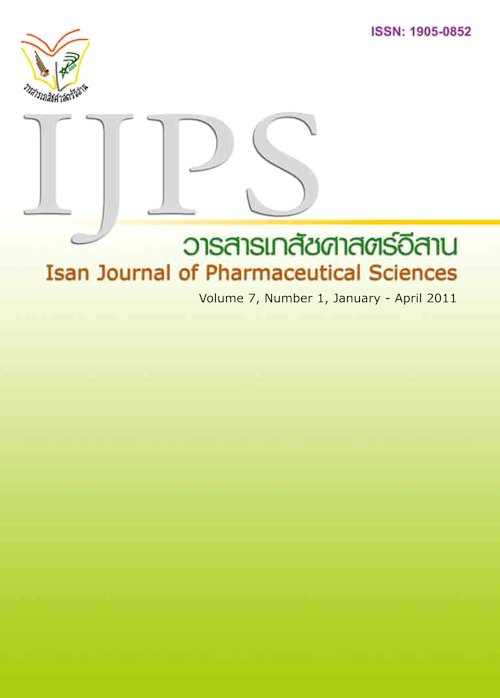Learning Styles of Pharmacy Students: Theory and Finding
Main Article Content
Abstract
Learning style is a pattern of behavior and performance by which each learner use to interact with and process information or educational experiences. There are various taxonomies of learning style proposed by many scholars. But, Kolb’s learning style is one of the most clearly elucidated theories which had been studied in wide area of educational research. Kolb explained the learning process as two distinct dimension, i.e., perception (how people perceive information) and processing (how people process that information). In terms of perception, the individual would either have a preference for concrete experience or abstract conceptualization. Then, four learning styles are differentiated as diverger, assimilators, converger and accommodator. The survey of pharmacy students’ learning style in Thailand and United States were shown that pharmacy students distributed through 4 learning styles, not an obvious majority. Educators should designed learning activities to ft with each learning style to foster the learning process, however, learner can use another learning styles in some situations. So, variety of learning activities are essential in current educational system.
Article Details
In the case that some parts are used by others The author must Confirm that obtaining permission to use some of the original authors. And must attach evidence That the permission has been included
References
Adamcik B, Hurley S, and Erramouspe J. Assessment of pharmacy students critical thinking and problem-solving abiities. Am J Pharm Ed 1996. 66: 256-265.
Bamrungsri R. An analysis of learning styles according to the experiential learning theory of University students’ in different fields of study. Thesis, Educational Psychology, Chulalongkorn University. (Thai). 1992.
Bennett S.I. Comprehensive Multicultural Education, Theory and Practice, Allyn & Bacon, Boston, 1990. pp. 140.
Felder R.M. Reaching the Second Tier: Learning and Teaching Styles in College Science Education. J College Science Teaching, 23(5), 1993. pp. 286-290.
Felder R.M. June 2002. Learning and Teaching Styles in Engeneering Education: Author’s Preface. Available at http://www4.ncsu.edu/unity/lockers/users/f/felder/public/Papers/LS-1988.pdf [Cited May 1, 2011].
Felder R.M. and Silverman L. “Learning and Teaching Styles in Engineering Education. “Engineering Education 78(7), 1988. pp. 674-681.
Hawk T.F. and Shah A.J. .Using Learning Style Instruments to Enhance Student Learning. Decision Sciences Journal of Innovative Education, 5(1), 2007. pp. 1-18.
Khammanee, T. Science of Teaching: Knowledge for effective learning process. Bangkok: Darnsuta Press, 2002.
Kiatnuntavimon P. A study of selected antecedent and consequent factors of nursing student’s learning styles. Thesis, Psychology Department,Chulalongkorn University. (Thai), 1986.
Kolb D.A. Experiential Learning: Experience as the Source of Learning and Development. Prentice-Hall, New Jersey, 1984.
Kow-trakul S. Educational Psychology. 5th ed. Bangkok: Chulalongkorn University Press. (Thai), 2002.
Litzinger, M.E., and Osif, B. Accommodating diverse learning styles: Designing instruction for electronic information sources. In L. Shirato and A. Abor (eds), What is Good Instruction Now? Library Instruction for the 90s. Miami: Pierian Press, 1993.
Muijs D. and Reynolds D. Effective Teaching: Evidence and Practice, SAGE, London, 2005. pp. 193.
Pungente M.D. Wasan K.M. and Moffett C. Using learning style to evaluate first-year pharmacy students’ preferences toward different activities associated with the problem-based learning approach. Am J Pharm Ed 2003. 66, 119-124.
Suriyakrai S. A development of an adaptive web-based learning model for individual differences based on the mastery learning principle to enhance learning achievement and problem solving skills of pharmacy students. Dissertation, Educational Communications and Technology, Chulalongkorn University. (Thai), 2007.
Suriyakrai S. A development of web-based learning system for individual differences based on the mastery learning principle to enhance learning achievement and problem solving skills of pharmacy students. Distance Learning and the Internet Conference 2007. December 12-15 2007, Chulalongkorn University, 2007.


